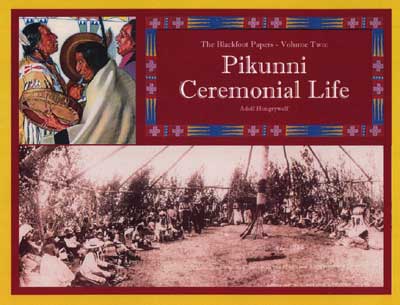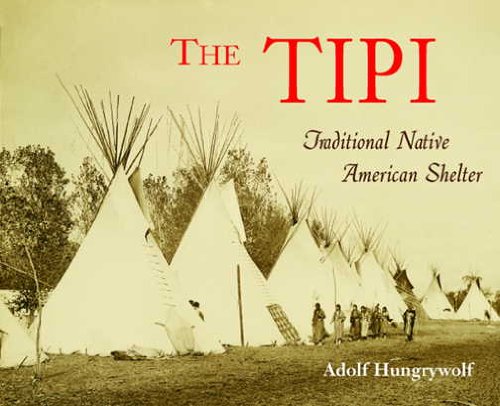Blackfoot Papers Now Available
The Blackfoot Papers
“The Blackfoot Papers” is a four-volume tribal documentary covering the history and culture of the Blackfeet Nation of Montana, traditionally known as the Pikunni People. Hundreds of stories and anecdotes by and about the Pikunni–both past and present–are combined with nearly 3,000 illustrations–many in colour–showing all the tribal chiefs and leaders, along with the heads of most families, their women and their children. Also shown are hundreds of scenes of tribal encampments, home and family life, cultural festivals and sacred ceremonials.
Forty-four years in the making, The work is available in four individual clothbound volumes, or as a boxed set. The four volumes are also available as a single edition, limited to 400 copies, signed, numbered, and hand-bound in leather.
“When I started this project in 1962,” recalls Adolf Hungry-Wolf, “it was planned as a memorial to a culture that everyone thought was dying out. Revival of Blackfoot culture since then has turned this work into a handbook for those struggling to keep alive Blackfoot heritage and culture for the future.”
Adolf Hungry-Wolf is a writer, historian and ceremonialist born in Southern Germany of Swiss and Hungarian parents. After schooling and university studies in California, he apprenticed himself to elderly medicine men and ceremonial leaders of the Blackfoot Confederacy. He learned to understand and practice many of their traditional, nature-oriented, ways. For over thirty years, he and his family have been holders of two of the Confederacy’s revered medicine bundles. He continues to follow a simple lifestyle on his family’s isolated homestead in the Canadian Rockies, where four of his children grew up with culture, prayers, home schooling and wild animals.
The project of assembling “The Blackfoot Papers began when Adolf Hungry-Wolf bought a collection of old photographs for a few dollars at an estate sale, as he was graduating from high school. At that time he was already completing his third book for publication, a photo-history of some well-known railroads. From the beginning, tribal leaders and elders encouraged his work, telling him stories and identifying persons and scenes in the old photos. In the process, he turned a childhood fascination for native culture and history into a commitment and way of life. Numerous descendants of the people in those old pictures have become his closest friends and relatives–his own children among them.
Working on “The Blackfoot Papers” has been a labor of love for Adolf Hungry-Wolf during the past 44 years, as he received neither payment nor funding of any sort. Furthermore, profits from the sale of this work will be used to support the continuation of Blackfeet heritage and culture. Contact the following for further information:
The publisher and distributor in Canada:
Good Medicine Cultural Foundation
P.O. Box 844
Skookumchuck, B.C. VOB 2EO
www.goodmedicinefoundation.com
The Blackfoot Papers – Volume One
Pikunni History and Culture
View Sample Pages
 |
|
Size Approximately:12 inches X 10 inches, 30.48 cm X 25.4 cm, 3.625 lbs, 1.644 kg 290 pages
learn more |
Back to Top
The Blackfoot Papers – Volume Two
Pikunni Ceremonial Life
View Sample Pages
 |
|
| Size Approximately:12 inches X 10 inches, 30.48 cm X 25.4 cm, 4.85 lbs, 2.20 kg 413 pages |
The Blackfoot Papers – Volume Three
Pikunni Portfolio
View Sample Pages
 |
|
| Size Approximately:12 inches X 10 inches, 30.48 cm X 25.4 cm, 2.80 lbs, 1.27 kg 203 pages |
The Blackfoot Papers – Volume Four
Pikunni Biographies
View Sample Pages
 |
|
| Size Approximately: 12 inches X 10 inches, 30.48 cm X 25.4 cm, 6.54 lbs, 2.96 kg 613 pagesPlease Note: pages are numbered consecutively from Volume One to Volume Four, Total number of pages for all 4 Volumes is 1524. |
The Blackfoot Papers – Boxed Set
All Four Volumes in a Boxed Slip Cover
The Tipi – Traditional Native American Shelter
 |
|
| THE TIPI – Traditional Native American ShelterThis amazing collection of vintage photographs and historical texts present an overall view of tipi life among the various Native peoples of the North American continent. From painted tipis of the Blackfoot and Shoshone in the West to Ojibwa hunting lodges in Canada, these pictures provide a cultural context for the people and their distinctive dwellings. Includes a section on how to make your own tipi, with patterns and illustrations.ISBN-13: 978-1-57067-174-6 224 pages, 8 1/4 X 7 1/2, softcover, 17.95. |
